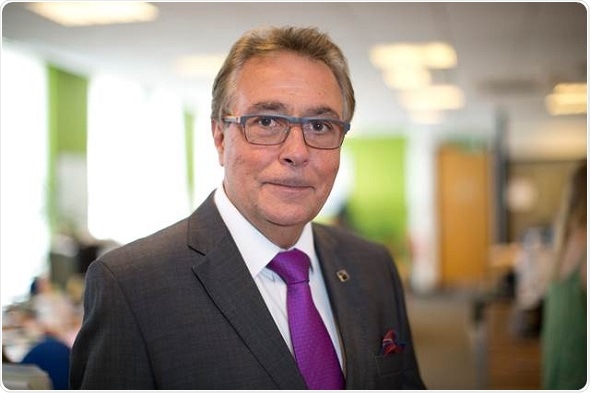Blood cancer charity, Anthony Nolan, is pleased to announce that their Scientific Director Professor Alejandro Madrigal, has been conferred with Honorary Membership of the European Society for Blood and Marrow Transplantation (EBMT) in recognition of his outstanding contributions in the field of hematopoietic stem cell transplantation (HSCT) and to the EBMT. He will be honored with this prestigious award at the Opening Ceremony of 46th Annual Meeting of EBMT in Madrid in April.

Anthony Nolan’s Chief Executive Henny Braund said:
A big reason why Anthony Nolan is able to play such a vital role in research has been the work of Professor Madrigal. This distinction has been granted in the past to only a small number of highly regarded individuals and we are incredibly proud that his contributions have been recognized in this way. Anthony Nolan and the patients that have benefitted from his work will be forever grateful.”
Professor Madrigal joined Anthony Nolan in 1993 as the first Scientific Director of the charity with the mission to establish the Anthony Nolan Research Institute, which was opened in 1996 by the HRH the Duchess of Kent.
He has transformed the Institute into a world-renowned academic center of excellence, where a large number of scientists and physicians from across the globe have been trained and, in addition, he has made substantial contributions to the everyday activities of the charity with the aim to improve the outcome of HSCT.
Over almost three decades, his team has made significant progress in improving donor matching, understanding the immunogenetic factors that impact on HSCT and developing methods to combat the main problems post-transplant, such as relapse, GvHD and infection.
Professor Madrigal holds the positions of Professor of Haematology and Country Ambassador for Mexico at University College London. Before joining Anthony Nolan, he trained at Harvard University and Stanford University, Imperial Cancer Research Fund and the Universidad Nacional Autonoma de Mexico.
During his tenure, 1,574 papers (h-index 79) have been published by the Anthony Nolan Research Institute. He has had over 500 papers published, which have been cited 11,783 times (h-index 60) and most notably, he has delivered 580 lectures in 243 cities in 58 countries.
Professor Madrigal said:
I am very honored indeed to receive this award and feel I am also receiving this on behalf of Anthony Nolan, as since its’ foundation in 1974, the Society has made major contributions to improving the outcome of HSCT worldwide and Anthony Nolan, as a pioneering Registry, has played a major role in contributing to saving the lives of many patients.
EBMT is very close to my heart; I have been an active member for many years, initially as Secretary of the Immunology Working Party, then as Chair of the Immunobiology Working Party and finally as President of the Society from 2010 to 2014. The Society has over 500 transplantation centers in more than 60 countries around the world with over 4,000 members.”
Professor Madrigal will be retiring from his post at Anthony Nolan and in recognition of his work, there will be a symposium in March at the Royal College Physicians on the contributions by the Anthony Nolan Research Institute to HSCT over 27 years and the current status of innovative cell therapies with contributions from eminent speakers from around the world.